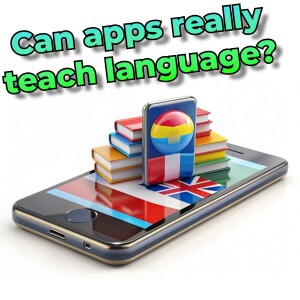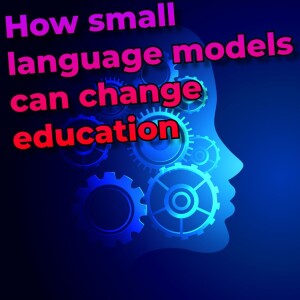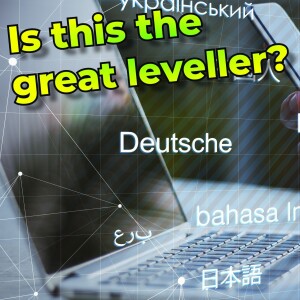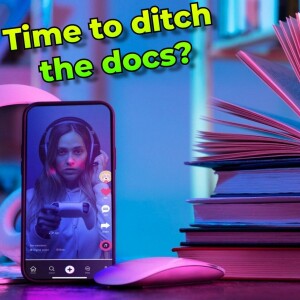The TELSIG Podcast
Does technology help or hinder learning? How can we make better use of digital tools in teaching? Phil Martin from the University of York dives into the neon-lit underworld of technology enhanced learning through conversations with experts in teaching and learning design. Each episode looks at how educators can stay current with their use of learning tech in this ever-changing landscape.
Episodes

Thursday Sep 19, 2024
Exploring AI’s role in modern language education, with Zoe Handley
Thursday Sep 19, 2024
Thursday Sep 19, 2024
Today I'm talking to Dr Zoe Handley about her research on English tutors' knowledge and beliefs about the use of AI in language teaching. Zoe shares her background, starting as a language learner using technology, and details the evolution of speech and language technologies over the past 20 years. We elaborate on the potential of AI technologies in language learning apps like Duolingo and the ethical and practical challenges these technologies bring to assessment and pedagogy. The conversation also explores the gap between research and classroom practice and the exciting opportunities AI can offer in education, particularly in literacy and personalized learning.
Dr Zoe Handley is an applied linguist specialising in Computer-Assisted Language Learning (CALL) with experience in the speech AI industry. Her research explores how the affordances of digital technologies might be harnessed to create the conditions and engage learners in the processes we know promote language learning. Her most highly cited publications include a systematic review of the evidence for the use of technology to support (English) language learning and a tool for measuring teachers' knowledge of technology to support (English) language learning. She has also carried out a number of evaluations of specific technologies including collaborative writing platforms and chat applications.
Further reading Handley, Z. (2024). Has artificial intelligence rendered language teaching obsolete?. The Modern Language Journal.

Thursday Sep 19, 2024
Deep diving into small language models with Dev Aditya
Thursday Sep 19, 2024
Thursday Sep 19, 2024
I'm joined today by Dev Aditya of OIAI by Otermans Institute. We discuss the innovative use of small language models in education, the development and deployment of an AI teacher, and how AI can help to upscale marginalized communities. Dev shares insights into the challenges and opportunities of AI in education, the effectiveness of small language models, and the future of AI-integrated learning environments. He also touches on societal impacts, the balance between screen time and human interaction, and the fast-paced landscape of AI technology.
Dev Aditya is an AI expert from London, UK. He is currently the AI product lead and CEO at Otermans Institute, where he led the team that built the first Digital Human AI teacher (OIAI). He has conducted research in AI and HCI with The Alan Turing Institute and Brunel University London.
Watch Dev and Pauldy’s TELSIG webinar: https://youtu.be/Y5QcTg6cfj8
Register for trial access to the OIAI teacher showcased in the talk: https://forms.gle/J9t2hMijGCbJwzZz5
Contact details:
Email: info@oiedu.co.uk
Website: https://www.portfolio.oiedu.co.uk
LinkedIn: / oiedu
X: / otermans_edu
Instagram: / oiedu19
Medium: / beatricefromoiai

Tuesday Sep 17, 2024
Tuesday Sep 17, 2024
Join us for this episode of the TELSIG Podcast, where we delve, that’s right, delve, into the world of machine translation and its influence on education with Klaus Mundt and Michael Groves, who have been researching and writing on this topic since 2015. We explore the evolution of machine translation tools from Babel Fish to today's advanced AI models like ChatGPT. The discussion uncovers the ramifications for student voice, authenticity, academic integrity, and policy within educational contexts. Phil, Mike and Klaus discuss how these technologies are reshaping language learning processes, the ethical dilemmas they present, and the future of English for Academic Purposes (EAP). Tune in for an engaging conversation about balancing technological advancements with traditional language teaching, and fostering academic integrity in a rapidly changing educational landscape.
Further reading
Groves, M. and Mundt, K. (2015) Friend or foe? Google Translate in language for academic purposes. Journal of English for Specific Purposes 37, pp.112-121. DOI: 10.1016/j.esp.2014.09.001
Mundt, K. And Groves, M. (2016) A double-edged sword: the merits and the policy implications of Google Translate in higher education. European Journal Of Higher Education 6:4, pp. 387-401. DOI: 10.1080/21568235.2016.1172248
Groves, M. and Mundt, K. (2021) ‘A ghostwriter in the machine? Attitudes of academic staff towards machine translation use in internationalised Higher Education. Journal of English for Academic Purposes. Vol. 50 https://doi.org/10.1016/j.jeap.2021.100957
Klaus Mundt is an Associate Professor at the University of Nottingham. He holds a PhD in Translation Studies, and his research interests focus on translation pedagogy and the use of machine translation in Higher Education. His main interest in teaching EAP on the ALACS programme is genre- and register-based language analysis and application, including subject-specific language. He is also involved in materials development and related studies such as genre and discourse analysis.
Michael Groves is Senior Lecturer at the Centre for English and Additional Languages at Lingnan University in Hong Kong. He has worked in the area of English Language Teaching for 30 years, and has specialised in English for Academic Purposes since 2007. He has worked in teaching and academic management roles in universities in the UK, China and Malaysia. He has also presented widely at conferences on a variety of topics. Mike’s research interests include student transition, with a particular interest in how students overcome “Academic Shock” when moving to a new place of study. He has also published on the use of online translation tools, and their impact on Internationalised Higher Education. In his free time, he enjoys running, cinema and wasting time on the Internet.

Monday Sep 16, 2024
The power of visual metaphors in teaching, with Richard Cotterill
Monday Sep 16, 2024
Monday Sep 16, 2024
As teachers, we have access to literally millions of high quality, freely-availably images thanks to resources such as Pixabay and Unsplash. In this episode we dig into the impactful use of visual metaphors in teaching with guest Dr Richard Cotterill, who shares insights from his recent research. Rich argues that visual metaphors can make abstract concepts more comprehensible for students. We explore the challenges and benefits of incorporating images into lectures, the importance of simplifying content, and practical techniques for educators.
Richard Cotterill has been a teacher for over thirty years. He teaches Foundation Business and Pre-Masters Management to students in the University of York's International Pathway College and undertakes research into learning processes and assessment. Richard is a Fellow of the HEA, a Certified Management and Business Educator, a Certified Member of the Association for Learning Technology and holder of the Vice Chancellor’s Teaching Award.
Email: richard.cotterill@york.ac.uk
Related links
Cotterill, R. (2024). Unlocking meaning using visual metaphors. Forum Magazine. [Online]. Available at: https://www.york.ac.uk/media/staffhome/learningandteaching/documents/forum/Forum-Magazine-Issue-52-Spring-2024.pdf
Lakoff, G. and Johnson, Mark. (1980). Metaphors we live by. Chicago: University of Chicago Press.

Monday Sep 16, 2024
E-authoring tools and their impact on teaching, with David Read
Monday Sep 16, 2024
Monday Sep 16, 2024
E-authoring tools like Articulate Storyline and Adobe Captivate have had a transformative impact on education. They allow teachers and course writers to quickly create visually appealing, interactive learning materials. Despite these benefits, their uptake often remains restricted to small circles of enthusiasts.
Today I talk to David Read from the University of Sheffield about and the benefits and potential challenges faced by teachers in adopting these technologies. We talk through the benefits of interactive digital content, the evolution of teaching methodologies, and the critical role of training and support in successful technology integration. We also explore the use of AI in content creation and the future of educational technologies. Perfect for educators, learning designers, and technology enthusiasts seeking to enhance their teaching and learning processes. Finally, we discuss how teachers and materials writers can get started with their own digital projects.
David Read is Academic Director for Technology Enhanced Learning at the University of Sheffield. He has been involved in language teaching for over 20 years, and recently spearheaded the introduction of e-authoring tools in the language provision at Sheffield.
Resources:
https://www.articulate.com/360/storyline/
https://h5p.org/
https://www.xerte.org.uk/
https://wordwall.net/

Wednesday Sep 04, 2024
Has technology changed teaching? With Rob Shaw and David Anderson
Wednesday Sep 04, 2024
Wednesday Sep 04, 2024
How has classroom practice changed as a result of the ever increasing availability of teaching technologies? We look specifically at polling tools, and consider the broader influence of such platforms.
Rob Shaw is an Educational Adviser in the Programme Design and Learning Technology Team and the Faculty contact for the Arts and Humanities. He is the service lead for Mentimeter classroom polling at the University, and he is interested in the effective integration of learning technologies at activity, session, module and programme levels.
David Anderson has been involved in teaching for over 30 years in Spain, Kuwait and the United Arab Emirates. He is currently based at the University of York where he teaches English for Academic Purposes to international students. He has a diverse range of interests, with a particular emphasis on reading strategies, vocabulary acquisition and materials development. A recurring theme over the years has been the desire to leverage technology (from Tipex to AI) to enhance teaching and learning.
Related links Shaw, R. (2023). Does the use of Mentimeter classroom polling spark joy (or at least some positivity) in learning and teaching? Forum Magazine. [Online]. Available at: https://www.york.ac.uk/media/staffhome/learningandteaching/documents/forum/Forum-Magazine-Issue-51-Summer-2023.pdf

Wednesday Sep 04, 2024
Virtual reality in higher education, with Sam Hazeldine
Wednesday Sep 04, 2024
Wednesday Sep 04, 2024
In this episode, Sam Hazeldine discusses the integration of virtual reality (VR) and augmented reality (AR) in education. We discuss the potential of AR and VR to enhance learning, clarify the definitions of VR, AR, and mixed reality, and talk about their practical applications in classrooms, such as simulations and interactive learning environments. Sam also addresses the accessibility of such technologies and the impact of AI on creating educational content. He emphasizes the importance of using these technologies to complement traditional teaching methods rather than replace them.
Sam Hazeldine is a learning technologist at the University of York's Creativity Lab. He is a former primary school teacher, and currently works with departments across the university to help them use digital technologies to improve learning.

Wednesday Sep 04, 2024
Wednesday Sep 04, 2024
This conversation from May 2023 took place in the wake of the launch of ChatGPT 3.5. We cover responses from institutions, policy, implications for teaching and assessment, questions raised and opportunities for research, and other topics.
Stephen Gow is responsible for the coordination of standards, assessment and academic integrity at the University of York, he has been working in this evolving role since 2014. Stephen spent 5 years in China prior to working at the University, he studied Chinese at Fudan University before teaching EAP at the Sydney Institute of Language and Commerce, Shanghai University and Tsinghua University. While working in China and then at the British Council, Cairo, Stephen completed his MRes at the Institute of Education before completing a PhD at the University of York. His research concerns understanding the educational, social, cultural, political and economic causes of the stereotype of Chinese students as susceptible to plagiarism. He is Chair of the Northern Academic Integrity Special Interest Group exploring sector wide approaches to contract cheating and is now focusing his research on the implications of artificial intelligence for academic integrity.
Related links European Network for Academic Integrity: https://www.academicintegrity.eu/wp/
JISC: Explore AI: https://exploreai.jisc.ac.uk/
UNESCO report on ChatGPT: https://www.iesalc.unesco.org/en/2023/04/14/chatgpt-and-artificial-intelligence-in-higher-education-quick-start-guide-and-interactive-seminar/
Sinica podcast: https://thechinaproject.com/2023/03/11/chinas-draft-regulations-on-generative-ai-with-kendra-schaefer-and-jeremy-daum/
Li, Y., et al. (2023). Can large language models write reflectively? https://www.sciencedirect.com/science/article/pii/S2666920X2300019X?via%3Dihub
Bearman, M. & Ajjawi, R. (2023). Learning to work with the black box: Pedagogy for a world with artificial intelligence. https://bera-journals.onlinelibrary.wiley.com/doi/10.1111/bjet.13337

Phil Martin is the TELSIG events coordinator and lecturer at the University of York's International Pathway College.
This podcast is recorded at the Creativity Lab with the support of Sam Hazeldine and Helen Claxton.
Theme music: "Smoke" by SoulProdMusic
Contact: phil.martin@york.ac.uk








